- Home
- Jana Petken
Swearing Allegiance (The Carmody Saga Book 1) Page 7
Swearing Allegiance (The Carmody Saga Book 1) Read online
Page 7
“If they are, they will be remembered as martyrs and great men who changed our country. A hundred years from now, their names will be on Dublin’s monuments,” Danny answered, still undeterred.
“Not all Dubliners supported your rising,” Patrick reminded him. “I suppose you heard about the people throwing stones at the rebels when they surrendered the College of Surgeons to the British?”
“I heard,” Danny said sullenly. “But those against us were by far outnumbered by the popular response we got at Boland’s Bakery and the South Dublin Union. And the Dublin Corporation is not condemning the rising.”
Smiling with a quiver of cynicism on his lips, Patrick said, “Well, that was to be expected. Its members and employees were heavily involved.”
“Sympathy for our actions has grown this past week,” Danny insisted. Lowering his voice, he added, “Patrick, no matter what your political leanings are, you must agree that we fought a clean fight in Ireland’s cause. You ask the men and women who were involved and they’ll tell you that we were always concerned for the suffering caused to the civilian population. We paid a high price, but we wanted to make a point, and we did.”
“And what was that, exactly?” Patrick asked.
“That the ownership of Ireland, moral and material, is vested by right in the people of Ireland, not Westminster. We’re sick and tired of listening to British lies and platitudes – and you should be too.”
Defeated, Patrick kept his conflicting thoughts to himself. There was growing admiration for the rebels, who, although poorly armed, had held out for much longer than expected against the recourses of an empire apparently willing and able to deploy limitless numbers of well-equipped troops. It was also true that the British response had been heavy-handed. At the wake, Kevin had told him that the army and police were conducting nationwide sweeps, confiscating arms, and still arresting men in their hundreds. Patrick wasn’t sure about exact numbers, but if rumours were to be believed, almost a thousand men had already been sent to England and interred there. And there would be more in the days and weeks to come. In his opinion, they were substantial figures in relation to the scale of the outbreak.
He was at a loss with what to do about Danny. But he believed that agreeing with him would be counterproductive. Unable to come up with a more persuasive argument, Patrick patted Danny’s shoulder, stood up, and went to the door.
“You’re eighteen now, and I can’t tell you what to do. Just think about what I’ve said, will you? Our family has no home to go to but Minnie’s. We’re at the end of our tether,” he said softly as he left the room.
Chapter Nine
When he was sure that everyone was downstairs, Danny climbed out of his bedroom window and onto the triangular roof that covered the back door’s porch. After jumping down to the ground, he ran to the end of the garden and wheeled his bicycle out of the shed. An early birthday gift, its rubber tyres were already fraying and well scratched by Dublin’s streets’ numerous potholes and uneven stony surfaces. Without mounting it, he reached the front gate, looked behind him, and saw that the parlour room curtains were drawn. His mam and Minnie were probably drinking yet another cup of tea. Cups of tea seemed to cure all ails in his house. They’d be setting a date to leave Ireland. They wouldn’t even be thinking about what he wanted. Glancing up, he could just make out Jenny’s shadowy figure on her bedroom wall. He had apologised to her at tea that afternoon. He shouldn’t have kept the news of John’s incarceration from her. He just wished she’d stop her whining.
Outside on the street, he took a moment to look at his dad’s motor car. The roof was back on. Patrick must be going out. He’d mentioned earlier that someone at the college was interested in buying the Daimler. Another grunt left Danny’s mouth. His poverty-stricken dad – what the hell had he been thinking, telling all those lies about how much money he had? His children would have loved him just as much had he come clean about his financial state of affairs. Jenny might have had one of her tantrums, but she would have recovered. Jesus, he still couldn’t believe that they were hard up!
Danny rode to Jimmy Carson’s house. Rainwater from puddles splashed his legs, drenching his trousers right up to his crotch. Glancing down at the saddle, he moaned. He looked as though he’d peed himself.
Arriving at Jimmy’s one-bedroom terraced house, he leaned the bicycle against a hedge and then looked at the house to see if any lights were on. Thank God he wasn’t too late, he thought, when he saw one dimly candlelit room. Jimmy was probably just finishing his dinner. Not usually getting home from work until seven o’clock most nights, he sometimes went straight to bed after he’d eaten. He worked long hours in Dublin’s port, loading cattle and agricultural exports onto boats. They left at least seven times a day as part of the eighty weekly sailings to England. It was a rotten job for pitiful wages.
“So … what do you think? Can I stay with you, Jimmy?” Danny asked after he had explained his situation. “It’ll only be for a short while. I’ll get back on my feet in no time.”
Sitting next to Jimmy at the table, Danny waited patiently for an answer and, at the same time, studied his friend, pensively sucking at a chicken bone. Jimmy looked much older than his twenty years, Danny thought. The first thing a person saw when looking at him was the full black beard that covered most of his face, but the skin that was visible was ruddy and rough and potholed, like the street where he lived. It looked burnt, as though he’d taken a scouring brush to his cheeks and scrubbed them using carbolic soap.
“Will you put me up or not?” Danny asked again, fed up with waiting for an answer.
“Maybe,” Jimmy replied, and then belched loudly. “I’ll have a think about it and let you know later in the week. I’m not sure if I’m going to stay here. I’ve been thinking about moving to the country. All I do all day is clean up cow dung on a boat. I may as well clean it up on a farm and get some fresh air while I’m at it. There’s more money to be had as a farm labourer than there is in the docks.”
“Is that right?”
“It is. The union stinks. It’s a waste of bloody time. They’ve got no interest in helping Catholics or nationalists. If they had their way, they’d only employ Protestants and British loyalists. Two of our boys have been sacked since the rising, and the union won’t fight the port authority to get their jobs back.”
“That’s not right.”
“Danny, we’ll all end up unemployed and running to the army just so we can get a wage.”
That was exactly what he had told Patrick, Danny thought. “Snakes will come back to Ireland and slither along the Liffey’s embankments before I join up,” he told Jimmy. “The only uniform you’ll ever see me wearing is the republican green. And as for the British, they’ll not be getting many new recruits now, and they know it. Why else would they send soldiers to guard their recruitment posters on the walls of the Four Courts?”
Jimmy sneered. “Sure, I saw that sight for myself.”
Sighing with impatience, Danny tried again. “Jimmy, come on, give me a bed for a week or two, a month at the most. You’re not leaving tomorrow or next week, are you?”
“I might be.”
After dinner, Danny got up from the table feeling let down. “I’ll be on my way, then,” he said gloomily.
“No, wait. I feel for you. Let’s have a wee toast to your dad,” Jimmy suggested.
Feeling slightly light-headed and a lot more optimistic after three tots, Danny asked, “Would you be willing to come with me for a wee bike ride? I know it’s past your bedtime, but I could really do with the company.”
“I will. I can’t go to bed like this. I’ll get dizzy when I lie down.”
Donal Doyle, in his mid-twenties, had been burdened by a name which most people had trouble saying, even when they were sober. Donal was Danny and Jimmy’s mentor, responsible for introducing them to Mr Pearse’s republican army and indoctrinating them in nationalist ideals with tales of British cruelty and heavy-handed dominatio
n. If anyone could help him, Donal could, Danny told Jimmy as they rode.
Approaching Dublin’s eastern suburbs, the two bikes had to swerve to miss a fox darting across the road. The sight of red foxes looking for scraps of food was becoming more frequent, Danny thought. The cheeky buggers were becoming daring or more desperate.
“Get out of the way, ya wee tyke!” he shouted. “You’ll be lucky to get so much as a dry bone in these parts!”
Danny then changed his mind. The fox might be luckier than he was. Jesus, all he was asking for was a bed or a bit of floor space for a few weeks.
Shivering in the front garden, Donal shook his head apologetically and then blew into his hands. “I’m sorry for your loss, Danny, and that your family is leaving. If it were up to me, you’d have a bed here for as long as you want, what with you being a good republican.”
“Is there no chance for me?”
“No, I’m not exactly in my dad’s good books at the moment. He said he’d throw me out on my ear if I ever marched or went to another meeting again. I’d tell him to take a leap frog into a pond, but I live under his roof.”
“I’m sorry to hear that decision, Donal. You were my last hope.”
“He called me a stupid bugger for getting involved in the rising,” Donal said, ignoring Danny’s remark.
“I got much the same at home,” Danny said. “They’re a load of eejits. They’ve got no backbones.”
Looking towards the front door, Donal whispered, “Actually, I’m glad you’re both here. I could do with your help tonight. How do you fancy moving a few guns with me?”
“Are you daft?” Jimmy asked, looking shocked. “Have you got brains like a half-chewed toffee? It’s too bloody dangerous. Where are they? How many are there?”
“How the hell did you get them here?” Danny wanted to know.
“Hush up, the both of you. For God’s sake, keep your voices down,” Donal said in a furious whisper. “They’re under my bed. Me and Billy O’Neil grabbed them from the post office and ran like the bejesus back here with them strapped to our backs, under our coats. There are eight rifles and three grenades.”
“Christ,” Danny uttered softly.
Donal continued. “The army is sweeping as far as the suburbs. It’s only a matter of time before they come knocking on my door, and if they find them, they’ll arrest me and lock me up. They’ve got my name on record.”
“Mine too,” Danny said, feeling a stirring of excitement. “So where do you want to take them?”
Pointing, Donal said, “At the other side of the woods is a path that leads to the Liffey. There’s a big oak tree there. I thought I’d use that as a marker and bury the guns next to it. We’ll have to go past some tenements blocks to get there, though.”
“That sounds risky,” Jimmy said.
“Not as risky as leaving them in my bedroom.”
“Sure, you’re right there,” Danny agreed.
“I was going to sneak out after my mam and da went to bed, but now I can tell them that I’m going for a walk with you two.”
The three men walked steadily until they were out of sight of the houses in Donal’s street, but once they got inside the woods they picked up their pace. The rain, which had started a few minutes earlier, was not much more than a soft drizzle, but thunderclaps heralded the arrival of a heavy downpour, and the trees, not yet furnished with a thick covering of leaves, wouldn’t give them much cover from a soaking.
Panting, Donal stopped at an old oak with a trunk the width of the three men standing side by side.
“We’re here. See those rocks over there?”
Danny and Jimmy nodded.
“We’ll bury the guns and then cover the soil with the rocks.”
Danny lifted a rock and carried it towards the hole that Jimmy had started to dig. Looking at the rifles while getting soaked, a thought struck him. He had a better idea than this one. This was stupid.
“It doesn’t seem right to put them in the ground. They’ll get ruined. I think we should hide them somewhere else. We’ll need them again when we get reorganised, and the place I have in mind is as dry as a bone,” he said to Donal and Jimmy.
Looking pensive, Jimmy asked, “Where?”
“I was thinking about the old tannery. It’s near the river, so we’ll be able to get to them again when we’re ready.”
Jimmy nodded in agreement. “That’s not a bad idea. What do you think, Donal? It’s been empty for at least two years. No one ever goes there.”
“We’ll do that,” Donal said.
Danny lifted a rifle wrapped in sheeting with a heavy heart. “The rising’s failure to ignite Irish passion for independence has broken my heart. Do you think we’ll get another chance to rise up again?” he asked nobody in particular.
“I do, Danny. And you, me, and Jimmy will be there in the thick of things,” Donal answered.
At the river, they stopped to take a breather. About half a mile south was the old tannery, once a highly profitable business until Dublin’s streets were forever changed with the arrival of trams, trucks, and motorised carriages. Danny missed the sound of horses’ hooves clip-clopping on cobbled streets. He wasn’t keen on the oily smell and chugging sound of those modern contraptions.
The blackened tannery sat on a piece of waste ground about three hundred feet from a row of tenements and one hundred feet from the river’s embankment. When the men got inside, they split up, with Danny climbing the broken stairs to the top floor. It was a large area with a maze of rooms stretching from one end of the building to the other, with a railing all the way around. Looking specifically for holes in walls, gaps in the wooden floorboards, or a significant pile of rubble that could hide eight rifles was not going to be easy, he thought. Donal, out of sight and sound downstairs, was the only one of the three of them to carry a torch. Danny couldn’t see two feet in front of him.
After having a good look around, he went back down the stairs, calling Donal’s name as he went. He wasn’t satisfied with what he’d seen. Upstairs was just an empty shell, bared of furniture and machinery. With no corners filled with dirt or walls with hidey-holes, there was nowhere suitable to conceal weapons of any kind.
Back on the ground floor, his eyes followed a moving torchlight, looking as though it were floating on air. Between him and the spark of brightness was a thick curtain of black. Stumbling forward like a moth to a flame, he called out Donal’s name again.
“I’m back. There’s nowhere to hide anything up there. Did you find anywhere down here?”
There was no answer.
More sparks of light hovered, coming towards him and growing brighter and larger by the second. There’s more than one torch there, he thought, feeling the hairs on the back of his neck bristle. A growing brightness then spread out in front of him, signifying that there were also torches behind him. Startled, he turned around, and his eyes met a blinding flash of light. He gasped and then felt the full force of a rifle butt strike his face. Stumbling backwards, dazed and disorientated, he fell onto his backside and groaned with the pain hammering at the side of his head.
“We’ve got the last of them, Sergeant!” he heard a man shout in an English accent.
Danny’s ears were ringing. Blood poured into his left eye from a gaping wound at his hairline, and his body felt weighted down by something. Looking up, his eyes flicked from one soldier to another. Trying to regain his senses as quickly as possible, he calculated that at least four soldiers surrounded him. They tugged at his arms and then pulled him roughly to his feet.
“C’mon, you – time to join your mates over there,” one of the soldiers said.
Stumbling through a fog, Danny felt his toes grate against the stone floor. His eyes were downcast and staring at a soldier’s boot heels in front of him, as they dragged him along. Yet he found it impossible to lift his head. They then suddenly released him, and his body slumped to the ground as though it were a rubber doll.
After managing to g
et onto his knees, he looked about him, but could see nothing but the blinding glare of torches shining in his face. He covered his eyes with his arms and then felt them being pulled until they were wrapped around the back of his head.
“That’s right. Just you keep them there, laddy,” someone said.
After the men shining the torches moved, Danny was able to see his surroundings more clearly. To his right, three soldiers aimed their rifles at Jimmy and Donal. Like him, they were kneeling on the ground with their hands clasped behind their heads, but unlike him, they had not had their skulls cracked open.
“Sorry, Danny, we couldn’t warn you,” Jimmy said, earning him a slap across the back of his head from a soldier.
“You bloody Fenians will never learn, will you?” the soldier who had struck Jimmy said. “Did you not get enough of a beating last week?”
Danny, focusing his eyes on Donal and Jimmy, sighed with resignation. The army was still out in force. He’d been made well aware of that fact from Kevin, who’d been at the funeral the previous day. They had probably been spotted and then followed since leaving the last of the tenements. He stared at a soldier who was asking Jimmy for his name. He wrote something down and then moved on to Donal. Danny shook his head in self-disgust. Stupidity, a touch of arrogance, bitterness, and hatred for the British had brought him to this, and now he’d just have to deal with the consequences of his actions – Patrick was going to bloody kill him.
Chapter Ten
Friday, 5 May
“I do wish Kevin would hurry up, Patrick. I’m cold,” Jenny said impatiently.
“Stop complaining, will you? Just be grateful that he’s arranged this meeting with us. He’ll get here when he can,” Patrick answered, just as edgily. Leaning against a wall opposite Kilmainham Gaol’s main gates, he pulled Jenny closer, gave her shoulder a brotherly rub, and then reminded her, “You insisted on coming with me, remember?”

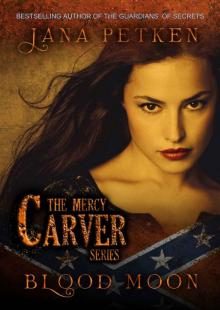 Blood Moon
Blood Moon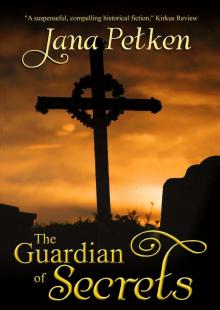 The Guardian of Secrets and Her Deathly Pact
The Guardian of Secrets and Her Deathly Pact Dark Shadows
Dark Shadows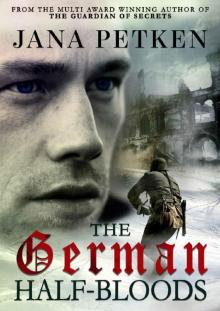 The German Half-Bloods (The Half-Bloods Trilogy Book 1)
The German Half-Bloods (The Half-Bloods Trilogy Book 1)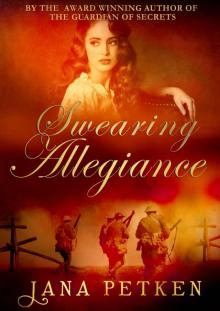 Swearing Allegiance (The Carmody Saga Book 1)
Swearing Allegiance (The Carmody Saga Book 1)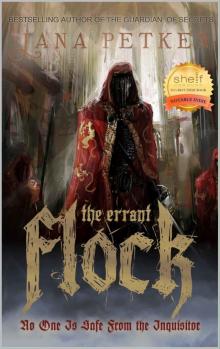 The Errant Flock
The Errant Flock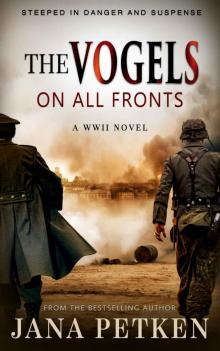 The Vogels: On All Fronts (The Half-Bloods Trilogy Book 2)
The Vogels: On All Fronts (The Half-Bloods Trilogy Book 2)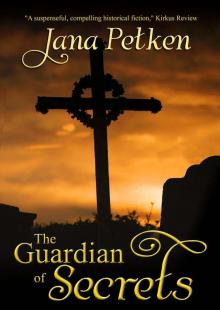 The Guardian of Secrets
The Guardian of Secrets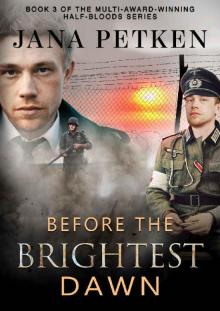 Before The Brightest Dawn (The Half-Bloods Trilogy Book 3)
Before The Brightest Dawn (The Half-Bloods Trilogy Book 3)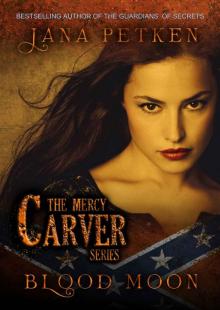 Blood Moon (The Mercy Carver Series Book 2)
Blood Moon (The Mercy Carver Series Book 2) Dark Shadows (The Mercy Carver Series Book 1)
Dark Shadows (The Mercy Carver Series Book 1)